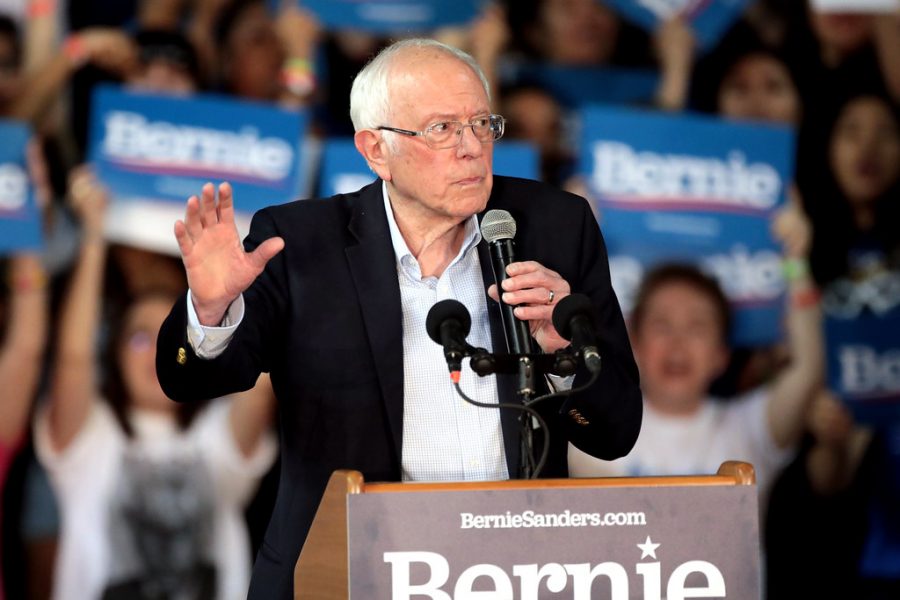Bernie Sanders Ends Campaign for 2020 Presidency
Photo Courtesy of Gage Skidmore
Former presidential candidate Bernie Sanders relied on grassroots efforts and sought the support of Americans through rallies, door-to-door campaigning and small donations averaging around $18, according to the New York Times. His voter base consisted of young progressives, Latinos and other people disillusioned with the wealth inequality in the nation.
Vermont Sen. Bernie Sanders officially suspended his presidential campaign on April 8, clearing the way for former vice president Joseph R. Biden Jr. to be the presumptive Democratic nominee. Sanders cited the current COVID-19 pandemic as a major reason for his withdrawal, as efforts such as rallies and door-to-door campaigning were no longer feasible.
Despite emerging as a frontrunner in the presidential race at the start of the primaries, having performed well in New Hampshire, Nevada and Iowa, Sanders suffered a series of losses to Biden in crucial states such as Michigan, according to the Washington Post.
Sanders thanked his supporters and campaign staff in a live-streamed video. That day, his campaign slogan #NotMeUs also trended on Twitter.
“I think by ending the campaign now, by focusing on my job at the United States Senate to help deal with this pandemic, deal with the economic collapse that we’re experiencing, I think it’s a better use of my time,” Sanders said in an interview with talk show host Stephen Colbert.
Both in the current run for the Democratic nomination and in 2016, Sanders struggled against overcoming the view of many Democrats, particularly leaders in the Democratic Party, who believed him to be too progressive for the party establishment.
“I think that [Sanders’] positions are seen by many people as radical, and there are many people including Democrats, traditional establishment Democrats, who hear terms like socialism and think about people like Joseph Stalin,” social studies teacher Daniel Hunter said. “It’s a whole worldview about the proletariat and the bourgeoisie and the class struggle over time. A lot of people when they hear ‘socialist,’ it doesn’t matter if you put the word ‘Democratic’ in front of it; that’s what comes to mind.”
While Sanders received support from younger voters under 30 as many Latinos, according to Vox, he failed to secure support from a core constituency: African-American voters. As a result, he suffered losses in many southern states as Biden pulled further ahead over the past two months, according to the New York Times.
In order to win the election, Biden acknowledged in a statement released on Wednesday that he would work to draw in support from Sanders’ coalition of progressive voters.
“I did vote for Bernie Sanders,” senior Ankith Desai said. “I definitely defended his ideals. Even when I cast my vote, I was fine with Biden being the nominee and hopefully president. I do not have a doubt that Joe Biden will do as good a job as president as Sanders. Sanders and Biden have the same goal in mind of how to serve the people. Their means of getting there are the only thing that separates them.”
Despite officially suspending his campaign, Sanders said that he will remain on the ballot for the remainder of the primaries in hopes of bringing more delegates, and thus, more influence, to the Democratic National Convention.
Sanders’ political platform and ideals changed not only the Democratic party but also the American political landscape. Policies like Sanders’ single-payer healthcare system, “Medicare for All,” that seemed outlandish in 2016 were supported by many of his opponents in 2020, according to NPR.
“Together we have transformed the American consciousness as to what kind of nation we can become and have taken this country a major step forward in the never ending struggle for economic justice, social justice, racial justice and environmental justice,” Sanders said in his livestream.
Your donation will support the student journalists of Portola High School. Your contribution will allow us to purchase equipment and cover our annual website hosting costs.

Annie Qiao is your 2019-20 Arts & Entertainment Editor for her fourth year at the Pilot! As a passionate admirer of the arts, she hopes to bring a...




